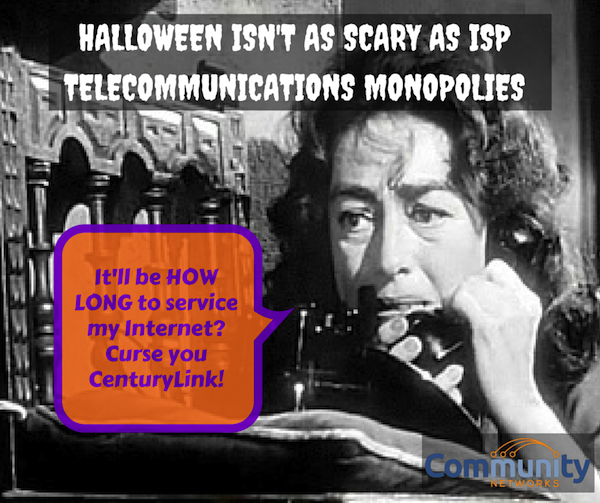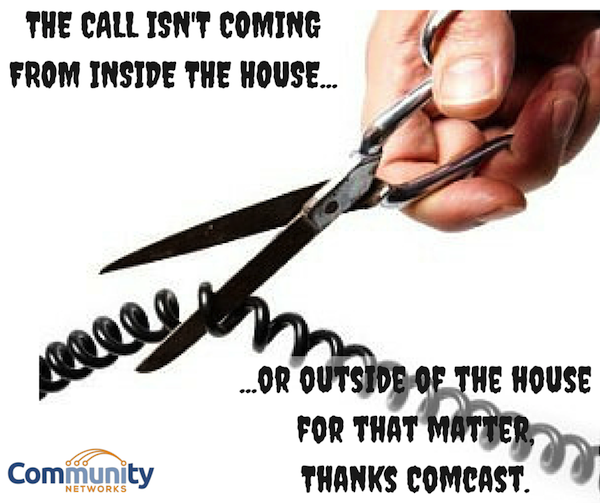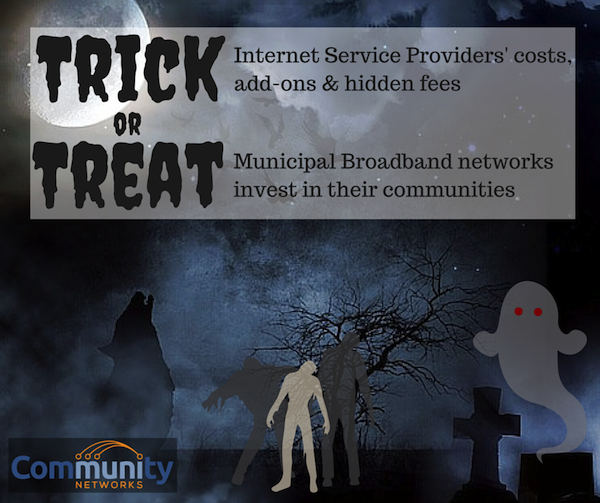
Fast, affordable Internet access for all.

The FCC is set to vote on whether or not to repeal network Neutrality under the deceptive guise of “Restoring Internet Freedom” on December 14th. Like others who study broadband and telecommunications policy, we’re distressed by the possibilities for the Internet and its users, should the Commission decide to repeal these protections. Because we use the Internet for so much in our daily lives, reversing network neutrality will give big ISPs like Comcast and Verizon undue power over what information we receive, our online business, and the result may negatively impact innovation.
We’ve gathered together some of our earlier posts on network neutrality to help explain why the policy is so important. In this collection, we’ve included some of our own writings as well as media that we consider paramount to understanding why we need to preserve network neutrality.
The Basics At 80 MPH (Video):
An old but a goody. In this video, Professor Tim Wu explains network neutrality, including paid prioritization. The video is from 2016.
The Big ISP Perspective (Video):
Many of us consider a free an open Internet a necessity to foster innovation and investment, but the words from the lips of the big ISPs are changing, depending on whom they’re talking to. This video reveals what they tell the government about network neutrality versus what they tell investors.
The Small ISP Perspective (Audio):
Like other small ISPs and municipal networks that offer services to the public, Sonic takes the opposite view of Comcast, Verizon, and other big corporate incumbents - they believe network neutrality is important and should be preserved. Dane Jasper, Sonic’s CEO and Co-Founder explains why innovation needs network neutrality in episode 261 of the Community Broadband Bits podcast.
Voters in 18 19 Colorado communities chose local telecommunications authority with an average rate of 83 percent. In Fort Collins, voters weren’t swayed by rivers of cash Comcast threw at them in the final month leading up to a ballot issue to pave the way for local fiber optic Internet infrastructure. By a comfortable margin, ballot measure 2B passed, allowing the city to proceed as it examines ways to improve competition and connectivity.
Fort Collins Voters Say Yes To 2B
Voters chose to amend the city charter in order to give the city council the ability to authorize the municipality to offer telecommunications services as a utility, rather than taking the issue to the voters in a separate referendum. The measure passed with a comfortable margin: 57 percent of voters approved the proposal.
The city has been investigating ways to improve connectivity for several years now because CenturyLink and Comcast are only providing a patchwork of substandard services. As a forward thinking community, Fort Collins wants to be sure that they don’t pass up any economic development opportunities. City leaders also feel that a municipal network is best positioned to offer affordable Internet access as a way to create an environment that is equitable and inclusive, especially for Fort Collins schoolchildren. The city is home to Colorado State University, which needs high-quality connectivity for research purposes. When considering the city’s social, economic, and development goals, the future ability to invest in Internet infrastructure makes sense. Comcast sees the measure as potential competition, the ultimate threat.
In order to allow the City Council to, at some date in the future, authorize the city municipal utilities to provide telecommunications services, Fort Collins needs to amend its city charter. Without this amendment, the City Council will need to take the issue to the voters, rather than by granting permission via ordinance. If Fort Collins decides to work with a private sector partner to deliver services, these same restrictions apply.
December 8th Update: WOW! The latest campaign report discloses that Priorities First spent a total of $901,000 during this campaign. Congrats on overcoming that Goliath, Fort Collins!
Fort Collins Update: On November 3rd, Comcast's front group Priorities First filed their most recent campaign report. The report showed that the group spent and additional $256,326 on the Fort Collins campaign between October 23rd and November 1st. This brings big incumbent spending to stop compeition to almost half a million dollars.
As the company with one of the largest ISPs in the nation, Comcast Corporation makes daily investment decisions. They choose to put company funds into a variety of ventures, from theme parks to hair color; all that matters is that the investment pays off. This election season, Comcast is once again devoting funds to an investment it considers necessary - influencing elections in Seattle and Fort Collins, Colorado. We've prepared a policy brief to look deeper into Comcast's investment into the elections.
Download the brief here: Comcast Spends Big on Local Elections: Would Lose Millions in Revenue from Real Broadband Competition.

As the company with one of the largest ISPs in the nation, Comcast Corporation makes daily investment decisions. They choose to put company funds into a variety of ventures, from theme parks to hair color; all that matters is that the investment pays off. During the 2017 election season, Comcast once again devoted funds to an investment it considered necessary - influencing elections in Seattle and Fort Collins, Colorado. We prepared a policy brief to look deeper into Comcast's investment into the elections.
Download the brief here: Comcast Spends Big on Local Elections: Would Lose Millions in Revenue from Real Broadband Competition.
Seattle
In Seattle, Comcast and CenturyLink donated $50,000 to a political action committee that supports a candidate opposed to publicly owned Internet infrastructure. This is only the latest attempt of the two national ISPs to influence the city’s mayoral elections; in 2013, they contributed similarly to Ed Murray, who went on to win the election. Murray was also opposed to the publicly owned option.
What monster makes you tremble? Chills you to the core? Sends shivers through your soul? Could it be…the Monopoly Monster? Count Comcast? The Mummy from the Last CenturyLink?
We know how you feel and to help ease the fears that quicken your pulse when your open your monthly Internet access bill, we’re reanimating several goodies from Halloween 2015. We’re haunted by how these still ring true!
Enjoy, download, share!




With their back against the wall, Comcast is pulling out it’s well manicured, sharp claws in Fort Collins, Colorado. Voters will be asked to approve measure 2B on November 7th, which would allow the city to take steps toward establishing their own municipal telecommunications utility. In order to preserve the lack of competition, incumbent Internet access providers are on track to spending more during this election than has been spent on any other issue in Fort Collins’ history.
Behind The Name Of "Citizen"
As we’ve come to see time and again, when a local community like Fort Collins takes steps to invest in the infrastructure they need for economic development, incumbents move in to prevent municipal efforts. Comcast and CenturyLink aren’t offering the types of connectivity that Fort Collins wants to progress, so the city has decided to ask the voters whether or not they feel a publicly owned broadband utility will meet their needs.
 In keeping with the usual modus operandi, out of the woodwork emerge lobbying groups that not-so-artfully mask incumbents like Comcast and CenturyLink. These groups are able to contribute large sums of money to whatever organization has been established, often in the form of a “citizens group,” to bombard local media with misinformation about municipal networks to try to convince voters to vote against the initiative. In Fort Collins, the “citizens group” happens to call itself Priorities of Fort Collins (PFC).
In keeping with the usual modus operandi, out of the woodwork emerge lobbying groups that not-so-artfully mask incumbents like Comcast and CenturyLink. These groups are able to contribute large sums of money to whatever organization has been established, often in the form of a “citizens group,” to bombard local media with misinformation about municipal networks to try to convince voters to vote against the initiative. In Fort Collins, the “citizens group” happens to call itself Priorities of Fort Collins (PFC).
A closer look at who is funding PFC’s website and professional videos takes one to the recently filed campaign report. The City Clerk’s Office has a copy of this document on file and shows that PFC has only three contributors, none of whom are individual “citizens” but are associated with big telecom:
Louisville has overcome a tall hurdle in its efforts to bring better connectivity and more competition to the community through local control. On August 16th the U.S. District Court for the Western District of Kentucky supported the city’s one touch make ready (OTMR) ordinance. AT&T challenged the ordinance in court, but their arguments fell flat and court confirmed that the city has the authority to manage its rights-of-way with OTMR.
State Law
AT&T’s claim based on state law asserted that the city was overstepping its authority by enacting the OTMR ordinance because it was impinging on Kentucky Public Service Commission jurisdiction. AT&T attorneys argued that, according to state law, the PSC has exclusive jurisdiction over utility rates and services, but the court found that argument incorrect.
Within the state law, the court found that the OTMR ordinance fell under a carve-out that allows Louisville to retain jurisdiction over its public rights-of-way as a matter of public safety. The ordinance helps limit traffic disruptions by reducing the number of instances trucks and crews need to tend to pole attachments. The court wrote in its Order:
AT&T narrowly characterizes Ordinance No. 21 as one that regulates pole attachments. But the ordinance actually prescribes the “method or manner of encumbering or placing burdens on” public rights-of-way. … It is undisputed that make-ready work can require blocking traffic and sidewalks multiple times to permit multiple crews to perform the same work on the same utility pole…. The one-touch make-ready ordinance requires that all necessary make-ready work be performed by a single crew, lessening the impact of make-ready work on public rights-of-way. … Louisville Metro has an important interest in managing its public rights-of-way to maximize efficiency and enhance public safety. … And Kentucky law preserves the right of cities to regulate public rights-of-way. … Because Ordinance No. 21 regulates public rights-of-way, it is within Louisville Metro’s constitutional authority to enact the ordinance, and [the state law granting authority to the PSC] cannot limit that authority.
Federal Jurisdiction
With the FCC taking another look at the advancements in network neutrality rules passed during the Obama administration, the topic has been on the lips of many segments of the population. Many of us consider a free an open Internet a necessity to foster innovation and investment, but the words from the lips of the big ISPs are changing, depending on whom they’re talking to.
The Internet Association, who went on record in 2015 in support local authority for Internet infrastructure investment, recently released a video about the fickle financial reporting of Comcast, AT&T, and Verizon.
The Internet Association describes the situation like this:
In our latest video, Internet Association takes a look at what Internet Service Providers (ISPs) told the government about net neutrality’s impact on investment and what they told their investors about its impact. They don’t quite match up.
Something to keep in mind: when companies like ISPs talk to their investors, they’re legally obligated to tell the truth.
The question of infrastructure investment is an important one because network investment helps the entire Internet economy grow and thrive. Innovative websites and apps fuel consumer demand for the Internet, which in turn fosters further network investment, which then fosters further innovation by websites and apps.
At Internet Association, we believe that the only way to preserve the free and open internet – and this cycle of innovation – is through strong, enforceable net neutrality rules like the ones currently on the books.
Check out the video and hear the contradictions from the lips CFOs who head up these big ISPs. What’s the real story here?
We’ve all been lied to, but when we’re lied to by those we rely on, it’s the worst. Right now, we are all subject to a lie about our Internet access. That lie is rooted in the idea that the best way to move forward is to allow the free market to dictate our access to the Internet, along with the quality of services, privacy protections, and competition.
The big ISPs try to tell us “it’s a competitive market,” then they tell their shareholders competition is scarce. They tell legislators they fear competing against relatively small municipal networks and cooperatives that only serve singular regions but they have subscribers in vast swaths across the country. Federal decision makers tout the benefits of competition, but approve consolidation efforts by a few powerful companies that are already behemoths. This reality is The Big Lie.
What can we do about it? First, understand the cause of the problem. Next, share that understanding. We’ve created this short video to explain The Big Lie; we encourage you to share it and to check out our other resources. Our fact sheets and reports are a great place to start if you’re looking for a way to improve connectivity in your community. Don't forget to check out our other videos, too.
In order to save public dollars, improve municipal connectivity, and enhance the city’s ability to take advantage of various “Smart City” technologies, Louisville is planning to grow its existing fiber infrastructure. Their plan will take advantage of aspects of the KentuckyWired project to reduce costs. An increasing number of local governments have taken a similar common sense approach and deployed fiber optic Institutional Networks (I-Nets). In addition to cutting telecommunications costs, the infrastructure gives communities the freedom to predict future expenditures and find innovative ways to use publicly owned fiber.
Grow What You Have, Smartly
Louisville already owns a little more than 21 miles of fiber within the downtown business district. Under the Mayor’s proposed budget, $5.4 million would be allocated to add another 97 miles to the network. The estimated cost of the project deployment is low for an urban project because there are locations along the proposed route that overlap with the KentuckyWired project. In those areas, the company that is working with the state, Macquarie Capital, will install the fiber optic cables for Louisville alongside the KentuckyWired infrastructure. Macquarie will deploy both underground and on utility poles. This arrangement greatly reduces the cost for Louisville because they only pay for the materials.
According to the city’s chief of civic innovation, without the contribution of KentuckyWired, the project would have cost more than $15 million.
The network is only meant to serve community anchor institutions, along with municipal and Jefferson County facilities; there are no plans to connect homes or businesses. Louisville could lease excess capacity to Internet Service Providers (ISPs) in the future, which would generate revenue for the community.